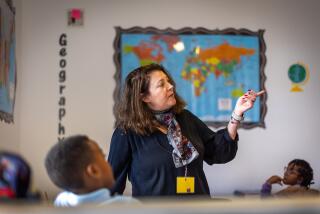Company Way to Learn : Education: G.T. Water Products gets high marks for providing an in-house school for workersâ children.
By high noon, Adam Tash has already put in a full morningâs work at G.T. Water Products, a plumbing parts factory in Moorpark.
He has molded his face out of clay and played a few rounds of a computer game before bellying up to the catering truck for some lunch. After noon, he swims.
For the record:
12:00 a.m. Aug. 31, 1991 For the Record
Los Angeles Times Saturday August 31, 1991 Ventura County Edition Metro Part B Page 4 Column 5 Zones Desk 1 inches; 30 words Type of Material: Correction
Special school--A caption with a photograph published Friday of Sean Fulton, a student at the G. T. Water Products school, incorrectly identified Nathan Cody as the boyâs father. Cody is an employee of the company.
If the activities sound a bit leisurely for a working stiff, itâs because 11-year-old Adam is one of 14 students in a school run exclusively for the children of G.T. Water Productsâ 30 employees.
âItâs a pioneer experiment,â said Adamâs father, George Tash, who owns G.T.
He credits the idea to his 14-year-old daughter, Jennifer. Four years ago, she was complaining bitterly about her school.
Tashâs own memories of his school days were bad, and he decided that he wouldnât make his children repeat the experience. So Tash converted a room in the 23,000-square-foot building that houses his factory and hired former Montessori teacher Brian Kearsey to run the classroom.
Before it opened, Adam and Jennifer Tash âwere miserable at private school,â their father said. âNow if Iâm not here by 8 a.m., theyâre pushing me out the door.â
Tash spends about $40,000 a year to keep the school going. The factory, which moved from Northridge to Moorpark four years ago, does about $3.5 million in annual sales, he said.
Workers said the free education for their children is an attractive benefit. About half the employees are working mothers, including Tashâs wife, Debra, who helps run the business.
The school is unusual enough that Working Mother magazine has listed G.T. Water Products as one of the 60 best employers in the country for the past four years.
The school has also earned notice in a new book, âCompanies That Care,â written by Hal Morgan and Kerry Tucker, alongside such firms as AT&T; and sportswear manufacturer Patagonia in Ventura.
Located in a busy factory district on Commerce Avenue, G.T. looks more like the industrial warehouses around it than an academic institution.
There are stacks of office paper, toilet plungers and other manufacturing equipment stocked outside Kearseyâs classroom. Nearby, the whine of heavy equipment can be heard above the childrenâs voices.
The classroom itself contains no chalkboards. Maps of the world and a whale poster adorn the walls alongside crayon drawings by some of the children.
Kearseyâs non-traditional teaching style also bears little resemblance to public school instruction.
There is no firm schedule, no homework and no lectures. Students arrive at 8 a.m. with their parents, and they can spend the morning reading quietly in a corner or drawing and playing with clay. Older students learn computer skills on the two computers.
Lessons come from workbook and writing assignments, and the 5- to 12-year-old students are given tests each year to make sure their performance is on par with their grade level.
Kearsey said he follows a strict weekly guide to make sure all academic areas are covered, including math, reading and spelling. Two other part-time teachers drop in weekly to offer lessons on art and science, Kearsey said.
It is not unusual to find the class out on a field trip. The children go on nature hikes, whale watching or visit Tashâs ranch to swim in his pool.
Kearsey acknowledges that his classroom sounds like all play and no work.
âLife should be fun,â he said with a shrug.
A spokesman for the state Department of Education said there are no strict specifications for private schools such as Tashâs. The only requirement is that regular attendance is taken and that a qualified teacher is present.
At lunchtime and breaks, the children may spend time with their parents. Parents frequently wander in to eat with the children.
âGeorge ends up getting employees that are happy with the company and are willing to put out 110%,â Kearsey said. âAnd if Mom ends up working an hour more, she doesnât have to worry about Joey down the hall.â
Rosa Velasquez, 26, and her husband both work at G.T. Water Products. Their daughter, Cynthia, 7, began at the school when it started, and a 4-year-old daughter will attend in December.
Velasquez likes the security of having her daughter near, as well as the fact that sheâs saving money on child care. She also believes that Cynthia gets a better education.
Jennifer Fulton, a 9-year-old freckle-faced redhead, said nobody calls Kearsey âMr.â To them heâs just Brian.
The school isnât ideal for all children.
Molly Ponceâs 11-year-old daughter, Sara, has decided to attend public school in Fillmore this year because there were no other girls her age. Ponce said she preferred having her daughter around while she was working, even when it meant interruptions in her clerical work.
âIt was really the first time in my life I didnât feel guilty about coming to work,â she said.
More to Read
Inside the business of entertainment
The Wide Shot brings you news, analysis and insights on everything from streaming wars to production â and what it all means for the future.
You may occasionally receive promotional content from the Los Angeles Times.










